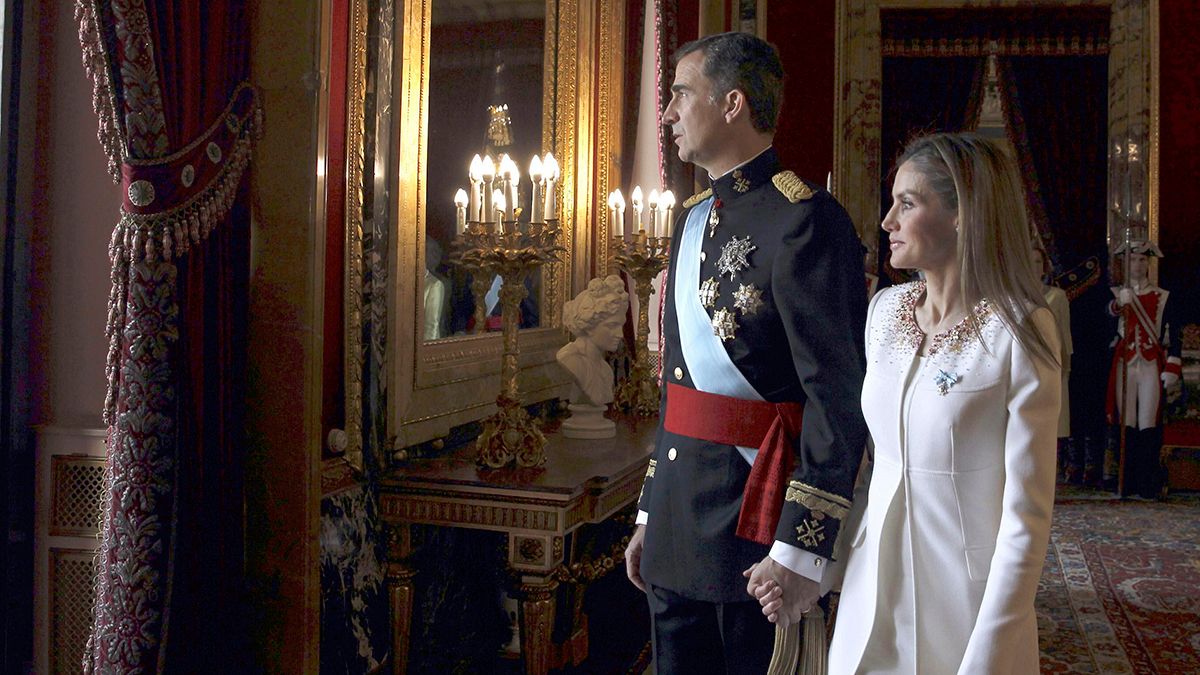First full day of as head of state for Spain’s new King Felipe. His Father King Juan Carlos helped him on with the Royal Sash denoting he is captain of the Armed Forces. Queen Letizia, their daughters, his mother, sister and nephew looked on in the Zarzuela Palace.
Parliament was next on the programme, a short drive in a Rolls Royce from the outskirts of Madrid to the centre. Calm reigned. Felipe has prepared his whole life for his symbolic role, must rise to the occasion. Spain is politically weakened, weary of corruption and socially furious from its sustained economic recession.
The Cortes Generales, the Spanish legislature, was the scene of his father taking the oath almost four decades ago. It was packed with distinguished guests dressed to the nines in a time of austerity.
The abdicated monarch watched in absentia, a stalwart of Spain’s evolution to democracy from dictatorship.
King Felipe said: “I pay homage, in the form of gratitude and respect, to my father King Juan Carlos I. I also thank my mother, Queen Sofia, for a whole life of impeccable service to Spain and the Spanish people.
“Today more than ever, the people rightfully ask that our public life be governed by moral principles, ethically inspired, exemplary. These are my convictions about the crown which, as of today, I incarnate.”
He pledged “a renewed monarchy for a new time.”
“Cervantes said, in the words of Don Quixote, you are not a man unless you do better than the next. I am proud of the Spanish people. Nothing would please me more than if, thanks to my work, they can feel proud of their new king.”
He said ‘thank you’ in Castillian and the regional languages Catalan, Galician and Basque — he is supposed to promote the unity of the constitutional monarchy — but the regional leaders sitting in the Parliament applauded less than others.
Madrid refused permission for a Republican rally.
Analysis of King Felipe VI’s first speech
Euronews reporter Francisco Fuentes spoke with Antoni Gutiérrez-Rubí, a specialist in communication policy, about the King’s first speech as monarch:
euronews: Antoni, what are your thoughts on the speech?
Gutiérrez:“The speech was well prepared, Felipe VI took time over the details and highlighted three important principles:
“One – To be under the parliament and public power, in other words, to respect the Constitutional and Parliamentary Monarchy.
“Two – To be a role model, he promised to behave morally and ethically to make the Spanish people feel proud and well represented by their head of state.
“Three -To bring something new.”
euronews: “On a scale of zero to ten, how would you rate the speech: a failure, average or excellent?”
Gutiérrez: “I think that today, Felipe VI gets full marks, he succeeded, almost with distinction .. he achieved what he wanted.
“But he was kind of .. unable to resume the heritage left by his father when, in his speech in December of last year, he spoke about “the need to reform our frames of coexistence.
“Felipe VI did not speak about the transition, or the spirit of the transition, he did not open the door to a new upcoming transition.
“That said, the background issues of the Spanish society are still there. They call for a renewed constitutional framework, integrating, if possible, a reflection or a decision on our state model.”
euronews: “Some of the ideas in the speech that stood out were the defense of the parliamentary monarchy and national unity, but not uniformity. What does that mean?”
Gutiérrez: “Formally, there are no changes, but there are signs of a rising awareness of diversity.
“Like when he says he wants to listen, to understand, to advise and to get the monarchy more able to listen, ot shows he identifies with the Spanish people.
“I think it is an interesting gesture which makes the monarch more sensitive, not only to those who agree with him, but also to a diverse range of people.”
euronews: “Speaking of that, you mentioned him opening up dialogue, which he showed when he said goodbye in Catalan, Galician and Basque, the other official languages. How will that happen?”
Gutiérrez: “I think we need to update how we reinforce, protect, and respect the languages, as the King said, are our common heritage.
“And this is something that needs a fresh policy, new political practices and some regulatory reforms, such as the settlement of the congress of deputies.”
euronews: “Following Felipe VI’s message, what are the possibilities for those who want a different form of government?”
Gutiérrez: “This speech, and in general, the whole process, from the abdication to the swearing in, has been a carefully crafted advert for the benefits of the monarchy, an advert that we in the media have contributed to in some way, as well as the analysts and commentators, but the problems are still the same.
“The King reigns but doesn’t govern, and it’s down to the majority political parties to solve these problems.”
